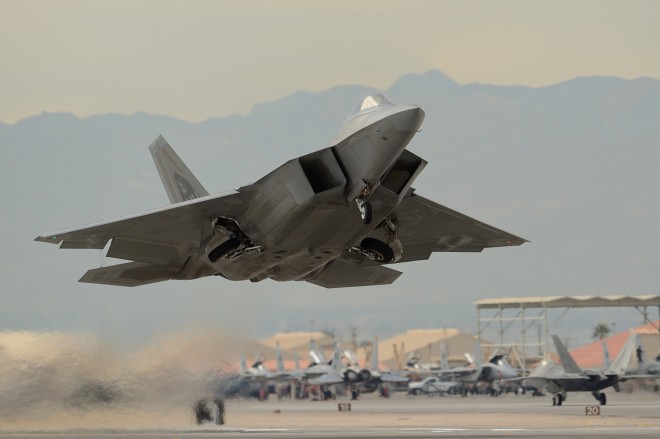
An F-22 takes off on a training flight last month. Photo: Air Force
– Air Force to Stealth Fighter Pilots: Get Used to Coughing Fits (Wired, Feb 25, 2013):
The Air Force has some bad news for the pilots of its F-22 Raptor stealth fighters: Your planes are going to make you feel crappy and there’s not much anyone can do about it. And the message to the maintainers of the radar-evading jet is even more depressing. Any illness they feel from working around the Raptor is apparently all in their heads, according to the Air Force.
Those admissions, buried in newly released Congressional records, represent the latest twist in the years-long saga of the F-22?s faulty oxygen system, which since at least 2008 has been choking pilots, leading to confusion, memory loss and blackouts — combined known as hypoxia — that may have contributed to at least one fatal crash. Ground crews have also reported growing sick while working around F-22s whose engines are running.
The Air Force claims its has a handle on the in-flight blackouts. All 180 or so F-22s are having faulty filters removed and new backup oxygen generators installed. There have also been changes to the G-suits pilots wear. But the Air Force says the alterations won’t do anything to fix the so-called “Raptor cough,” a chronic condition afflicting almost all F-22 pilots.
The coughing — which, to be clear, is a totally separate issue from hypoxia — is due to a condition known as “acceleration atelectasis,” Maj. Gen. Charles Lyon, who headed the Air Force’s Raptor investigation, wrote in response to questions submitted following a September testimony before a House subcommittee. “Acceleration atelectasis results from pilots breathing high concentrations of oxygen (above 60 percent) while wearing anti-G trousers, and exposure to G-forces,” Lyon explained.
Maj. Jeremy Gordon, a Virginia Raptor flier who blew the whistle on the Air Force last year, described a typical room full of F-22 pilots where “the vast majority will be coughing a lot of the time.” One Air Force widow claimed her F-22 pilot husband’s coughing contributed to his suicide.
The coughing, Lyon continued, results from the closure of the lungs’ alveoli as oxygen-rich air is absorbed, leaving insufficient gas such as nitrogen behind to keep the alveoli open. “The normal physiologic response to re-open the alveoli is to cough,” Lyon wrote adding that an F–22 feeds its pilot higher concentrations of oxygen compared to other jets. Air Force spokesman Lt. Col. Tadd Sholtis told ABC News that the Raptor’s extreme performance — flying higher and faster than most planes — could also exacerbate the cough.
“The Air Force will continue to explore further potential causes through long term breathing air analysis and human systems integration efforts,” Lyon wrote. But he offered no solution to the condition. Apparently, from the Air Force’s point of view, coughing is the cost of sitting the world’s most high-tech fighter cockpit.
With regard to the maintainers who reported symptoms alongside the oxygen-deprived F-22 pilots, Lyon wrote that the Air Force conducted extensive testing and found no evidence that the ground crews were actually sick. “None of the ground incident aircraft cockpit testing revealed anything approaching a remarkable health guidance value,” Lyon explained. “None of the maintainer blood, breath or urine samples indicated anything remarkable.”
Lyon wrote that the Air Force has ruled out any adverse health effects from toxic fluid leaks, hazardous particles from the Raptor’s stealth coating and the possible impact of breathing the F-22?s engine exhaust. If the maintainers really were sick, as they claimed, the Air Force is “confident that factors other than the life support system or the aircraft caused the ground incidents,” Lyon wrote.
The F-22, arguably the most capable jet fighting in the world, is the mainstay of the Air Force’s frontline fleet and has even gotten more money, even while the rest of the military braces for impending budget cuts. Raptor pilots and ground crews shoulder a large part of the burden of deploying American power in the sky. The flying branch’s brass seem to believe coughing, and possibly imaginary illness on the ground, are just part of the job.